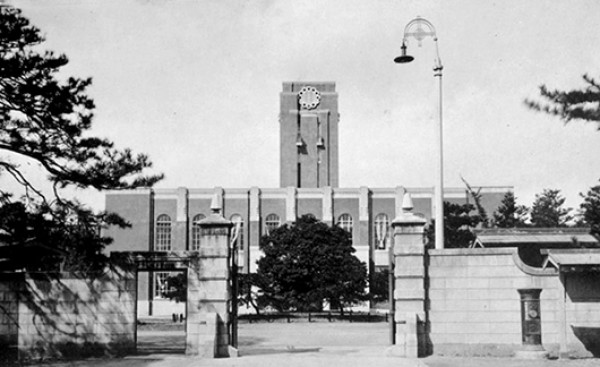
Historical sketch
Kyoto Imperial University was founded by imperial ordinance on 18 June 1897, the second university to be established in Japan.
Within ten years of the founding of the University, the Colleges of Science and Engineering, Law, Medicine, and Letters were opened. In July 1914 the College of Science and Engineering was divided into the College of Science and the College of Engineering, giving the University five Colleges. In accordance with the promulgation of the Imperial University Law, the Colleges were reorganized in February 1919 to form the Faculties of Law, Medicine, Engineering, Letters, and Science, and in the following May the Faculty of Economics was established.
In the early period of the University, presidents were chosen by the Ministry of Education. However, faculty members increasingly desired more autonomy. In 1915, opinions from the faculties were considered in the selection of the new president for the first time, and eventually, in 1919, a system for the election of presidents by the faculty members themselves was introduced.
In 1923 the Faculty of Agriculture was established. As the demand for education increased, so did the number of students, and a succession of research institutes attached to the University's faculties were founded together with various other establishments.
The prewar and war years were a difficult period for the University, but with the end of the war a liberal atmosphere was restored, and in March 1947 the School Education Law was enacted, bringing widespread reforms to the Japanese education system. The aims of this reform were to affirm the principles of equal educational opportunity, and to expand all levels of education, including higher education. In October 1947 Kyoto Imperial University was renamed Kyoto University. In May 1949 the National School Establishment Law was enacted and Kyoto University was reorganized as a four-year instead of a three-year university. The 8th faculty, the Faculty of Education, was also established that year.
In May 1949 the Third High School ( Dai San Kou ) was affiliated to the University. The High School had been providing education in the liberal arts since 1894, and traced its origin to the Seimi-Kyoku, founded in Osaka in 1869, one of the first institutions in Japan to teach western sciences. In September 1949, the Third High School was reorganized to provide general education and renamed the College of Liberal Arts.
In April 1953, in accordance with a new national educational regulation, the Kyoto University graduate school system was founded to provide a more systematic postgraduate education in the Graduate Schools of Letters, Education, Law, Economics, Science, Pharmaceutical Sciences, Engineering, and Agriculture. In April 1954 the College of Liberal Arts and Sciences was established, and in July 1955 the Graduate School of Medicine was founded following an amendment of the Education Law. In April 1960, the Faculty of Medicine was divided into two new institutions. One retained the name of the Faculty of Medicine, and the second was named the Faculty of Pharmaceutical Sciences. More recently, in October 1992, the College of Liberal Arts and Sciences was reorganized as the university’s 10th Faculty and named the Faculty of Integrated Human Studies. In recent years, Kyoto University increasingly emphasized graduate-level activities, and has established new graduate schools to tackle emerging problems anticipated to be critical in this century: the Graduate Schools of Human and Environmental Studies, Energy Science, Asian and African Area Studies, Informatics, Biostudies, and Global Environmental Studies. Kyoto University currently has fifteen graduate schools, and traditional academic domains are being reorganized into new disciplines to meet the needs of the coming age. As of 2017, Kyoto University has ten Faculties, eighteen Graduate Schools, thirteen Research Institutes, and twenty-two Research and Educational Centers.

